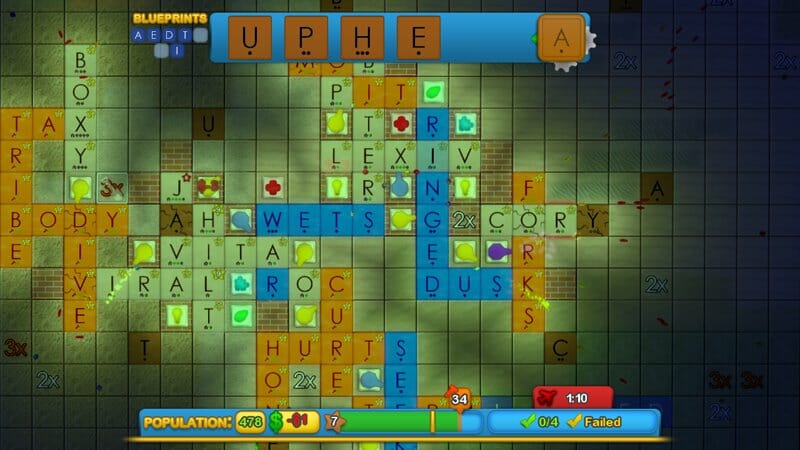Lexiv (360)

There is, in the mapping world, a form called the typographic map. Words are wrought into geographic shapes they name or describe. The meaning of the word and its shape, and the relationship between the two, are key to understanding this map of words. Andrew Gaubatz’s Lexiv, which combines Scrabble and Sim City and tower defense and RPG leveling and slot machines and Breakout, is about building a map of words. Sort of.
Like Scrabble, Lexiv doesn’t concern itself with what a word means. In Lexiv, how a word means – its part of speech – is what matters. The dictionary is a limiter, a way to give form to board management and point maximization. Your vocabulary is a resource, but not necessarily the most important one – like most digital versions of Scrabble-with-Friends, Lexiv doesn’t let you build a word not in its dictionary.
There are no turns, just a game clock and steady production of letters (they fade in on a blank block so you know what’s coming next). It helps the game avoid the problem Garrett encountered in yesterday’s Quarrel review: you’re almost never in a situation where a few seconds matter, so having to cycle through the letters isn’t a hindrance. They’re stored in a “dock”, a Scrabble rack, and you use them to build words on a grid in a number of different scenarios.

Sometimes you’re trying to build your city to a certain level; sometimes you have to survive a certain amount of time while being attacked by waves of invaders; sometimes you’re building words of a certain length or on specific squares. Victory conditions are listed before you start a scenario, and you’ll always know thanks to a “DANGER!” warning if your city is in danger of being attacked during it.
You solve common city-simulation problems, but knowledge of economic theories is replaced by vocabulary: address homelessness by building more nouns, unemployment by building more verbs. Or you can use adjectives or adverbs to increase the quality of your already-existent nouns or verbs (the “Etc” category covers other parts of speech, like interjections that boost both nouns and verbs – though the game’s word-sorting is sometimes questionable). Once a noun or verb has been affected by a modifying word, the citizens of its letters will demand you provide them with services. It takes both to boost a letter’s value.
Fortunately, your citizens are not picky. They just want a combination of four essential services: health care, energy, recreation, and education. Building a service costs a few dollars and takes up one of the grid squares. Services (and, in Danger! scenarios, turrets) affect a circular area. No worries about building roads to connect services to people: in Lexiv, there is no infrastructure. This setup makes dense Lexiv cities easier to defend and service: build one on an empty square amid a bunch of tightly organized words and its efficiency is reward for your efficiency in planning.
